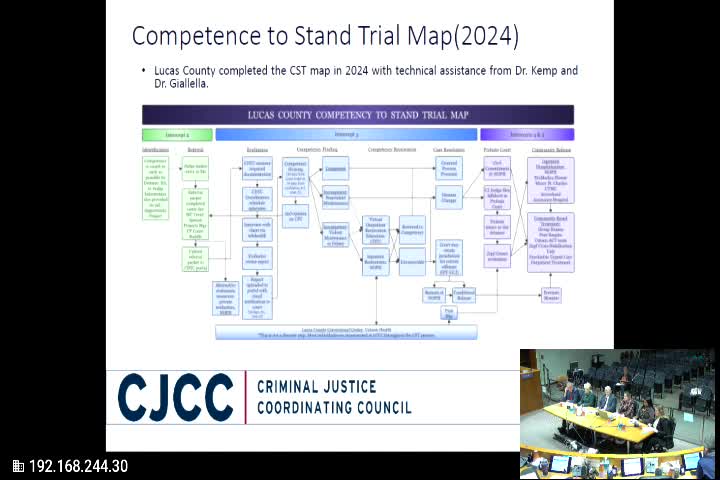Toledo presenters outline diversion, crisis care and co-responder plans including $550,000 federal grant
Get AI-powered insights, summaries, and transcripts
Subscribe
Summary
CJCC behavioral-health staff described diversion programming, the Zeph Center care center that has accepted 116 crisis drop-offs (94 from Toledo PD), a planned co-responder unit funded at about $550,000 and a $678,332 grant to expand adult treatment court services.
Annie Minton, the Criminal Justice Behavioral Health coordinator for the CJCC, told the Toledo City Council Public Safety Committee that the CJCC’s Behavioral Health Criminal Justice (BHCJ) committee is focusing on diversion, competence-to-stand-trial pathways and a co-responder model pairing officers with licensed mental-health clinicians.
Minton said the Zeph Center care center has taken 116 drop-offs since opening, 94 of them brought by the Toledo Police Department, and described the center as an important deflection alternative to incarceration. “This is serving Toledo residents,” she said, adding the model helps avoid the harder work of managing people once they’re incarcerated.
On co-response and grants: Minton said the CJCC won a competitive federal grant of about $550,000 to establish a co-responder program in Toledo; the money will fund planning and two years of implementation. She also said the CJCC received $678,332 to enhance the adult treatment court, adding peer-support specialists and home-based family therapy for participants.
Why it matters: The BHCJ coordinator emphasized that diversion and immediate crisis care reduce inappropriate incarceration and improve access to treatment. Minton noted statewide funding opportunities: the Ohio Department of Behavioral Health included $11.7 million in a proposed budget for diversion programs, but Minton said that line was removed before final passage and that local advocates are still pursuing other funding routes.
Council follow-up and timeline: Presenters said local program evaluations are underway and that a national randomized-control study by Harvard will take years to produce definitive recidivism outcomes. Committee members asked for interim recidivism measures and more information about where funding will come from if state funding is not restored.
Next steps: CJCC staff said they are planning a study trip to Denver to review established co-responder programs and will return with implementation lessons and timelines.
